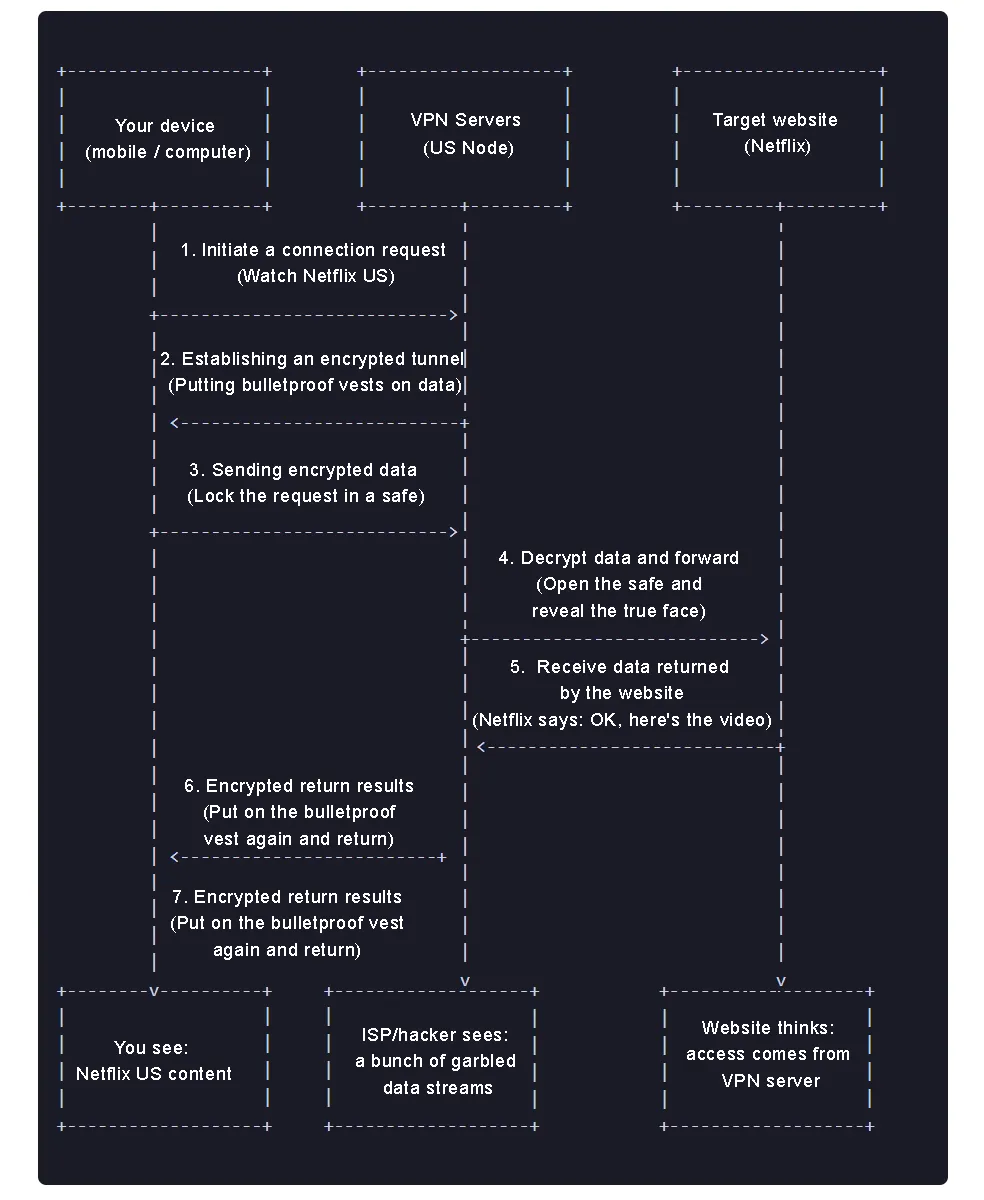What is a VPN and How VPNs work (easy to understand)
⏰ 2025-03-08 15:44✍🏼 Help Center👀 📊 4782
What is VPN?
In daily life or work, we sometimes hear "VPN". If you have not used it or just got started with VPN, you must be unfamiliar with what VPN is. VPN is not mysterious!
In one sentence: VPN (Virtual Private Network) is a technology that hides your network activities and protects privacy through encrypted channels, making your data transmission on public networks safer.
VPN provides users with a secure channel through encapsulation and encryption technology, ensuring the security and integrity of data transmission, effectively preventing data leakage and tampering, and protecting users' privacy and data security when using public networks. It allows remote users or devices to securely access internal network resources as if they were directly connected to the local network.
How VPN works:
For users who have never used VPN, it may seem mysterious. In fact, once you understand how it works, you will understand the importance of using VPN in daily life. The following will introduce in detail how VPN works. The working principle of VPN is roughly divided into 4 steps. Without any link in the middle, it cannot be a safe and reliable VPN.
1. Connection establishment: The user device establishes a secure encrypted channel with the VPN server through the Internet.
2. Data encryption: The local device encrypts the original data and sends it to the VPN server through an encrypted channel.
3. Transit transmission: The VPN server decrypts the data and forwards the request to the target website or service on behalf of the user.
4. Return result: The data returned by the target website is encrypted again by the VPN server and transmitted back to the user device through an encrypted channel.

Examples of what VPN is and how to maintain anonymity and encryption:
Although the above introduction is what VPN is and how it works, it is still a bit difficult for many Internet novices to understand. Some people may understand what VPN is now but forget it after a while. The reason is that the above introduction is all professional terms, which cannot be associated with daily life for many users who have no Internet knowledge. The following examples will explain what VPN is and how VPN allows users to maintain anonymity and encrypt information.
Case 1: "Secrets" in Letters
Imagine that you are writing a letter containing your secrets.
Without VPN: You put the letter in a transparent envelope and send it through the post. Anyone along the way, such as a nosy neighbor or postal worker, can see your secrets.
With VPN: Before you send the letter, you put it in a special box with a combination lock. This box can only be opened by you and your friend at the other end. Even if someone gets the box during transportation, they can't see the contents because the box is locked.
Case 2: "Passing a note" in a cafe
Imagine that you want to ask someone to pass a secret note to a friend in a cafe, but you are worried that others will peek at it. So you:
Find a reliable helper: put the note in a magic box that only you and the helper can open (encryption);
Hide your identity: let the helper deliver the note on your behalf, and the recipient can only see the helper's address (hide IP);
Safe delivery: the helper uses the magic box to deliver the note to the friend, and others cannot peek at the content during the whole process (anti-eavesdropping);
Two-way protection: the friend's reply is also encrypted and sent back to you through the helper's magic box (full encryption channel).
The difference between VPN and proxy
I believe many people want to know what is the difference between VPN and proxy? Is proxy a type of VPN? The following will introduce the difference between VPN and proxy in detail.
Both VPN and proxy are used to hide the real IP address, but the core difference lies in security, encryption range and functional level.
Imagine you want to secretly send a letter:
- Proxy: Hire someone to deliver the letter for you, but the content of the letter is not locked, and the messenger may peek or lose it (high risk).
- VPN: Lock the letter in a safe, and then have someone escort the safe to the destination, and no one can open the box during the whole process (strong security).
Summary:
- Need full security protection (such as bank transfer) → Choose VPN.
- Just need to change IP temporarily (such as browsing social media) → Choose proxy.

Help Center
Rapid VPN Help Center helps everyone popularize VPN-related knowledge and understand the industry. It has helped hundreds of users solve VPN usage problems.

